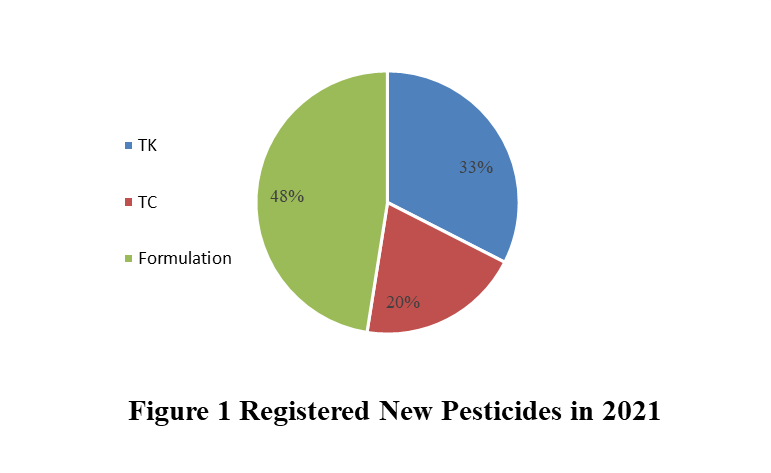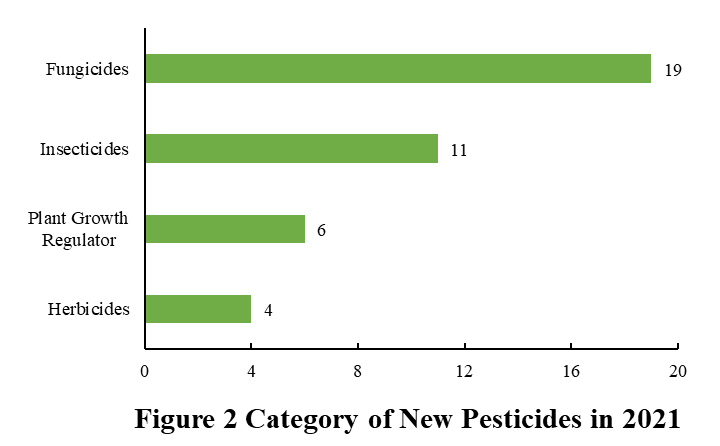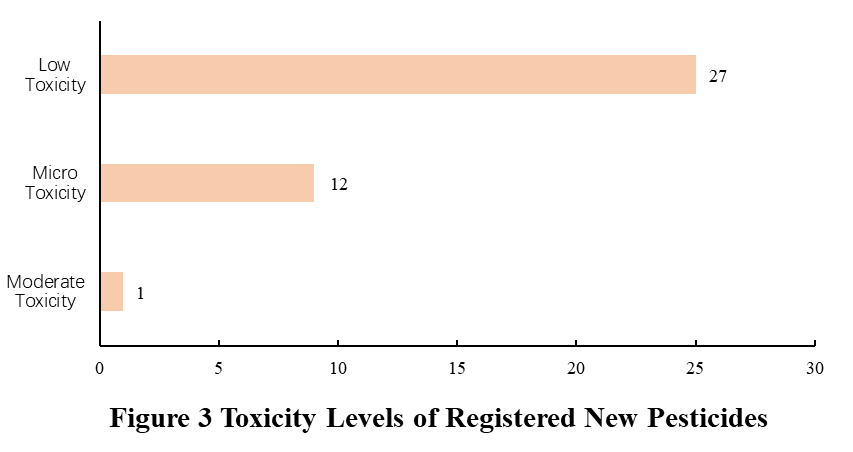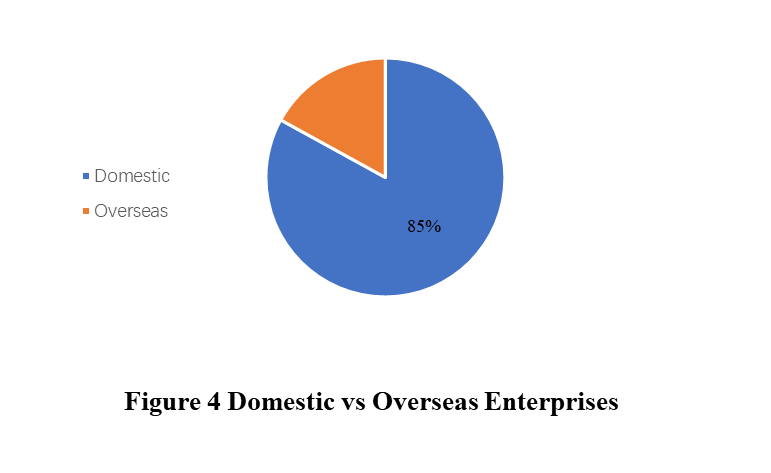New pesticides refer to pesticide products containing active substances not yet registered in China, including new pesticide TK (TC) and new formulations. As the new Regulations on Pesticide Administration and new Data Requirements on Pesticide Registration come into force, it becomes increasingly challenging to register a new pesticide in China. Despite high data requirements and rigorous review, many new pesticides got approved in 2021. The number of approved new active ingredients in China has increased significantly when compared to 2020 data.
Statistics on Approved New Pesticide Registrations in China in 2021
According to the data published on the website of the Ministry of Agriculture of Rural Affairs (MARA) in 2021, there are a total of 40 registered new pesticides in China, which is a significant increase when comparing with only 5 new pesticides approved in 2020. Among the 40 new pesticide products, 13 are TGAIs (including 5 for export only), accounting for 32%; 8 are TCs, accounting for 20%, and 19 are finished formulations, accounting for 48%. Please see Figure 1 for more information.
 In 2021, a total of 26 new active ingredients got approved in China (see table 1), of which 5 active ingredients are for export only, and most of the 21 new active ingredients for domestic use are biopesticides. This may be due to the strict data requirements and evaluation criteria for the registration of new chemical pesticides, and many of the registrations submitted have been rejected because of the requirements to provide toxicological information on metabolites. The registration data requirements for biopesticides are relatively low, the uncertainty is also lower, and it is more likely to obtain registrations earlier.
In 2021, a total of 26 new active ingredients got approved in China (see table 1), of which 5 active ingredients are for export only, and most of the 21 new active ingredients for domestic use are biopesticides. This may be due to the strict data requirements and evaluation criteria for the registration of new chemical pesticides, and many of the registrations submitted have been rejected because of the requirements to provide toxicological information on metabolites. The registration data requirements for biopesticides are relatively low, the uncertainty is also lower, and it is more likely to obtain registrations earlier.
Category of New Pesticides Registered in China in 2021
Pesticides can be divided into fungicides, insecticides, herbicides, plant growth regulators and public health pesticides according to the control target or scope of use. The statistics of newly registered pesticides in 2021 are shown in Figure 2, of which 19 are fungicides, accounting for 48%; 11 insecticides, accounting for 27%; 4 plant growth regulators, accounting for 10%; and 6 herbicides, accounting for 15%. In 2021, fungicides account for almost half of the new pesticide registrations, which shows that the research and development of new fungicides continue to be a hot spot in the industry, followed by the research and development of new insecticides.

Toxicity Level of Registered New Pesticides in China in 2021
In 2021, the statistics of the toxicity levels of newly registered pesticides in China are shown in Figure 3. Among 40 new pesticides, 27 are low-toxic, accounting for 68%; 12 are micro-toxic, accounting for 30%; and 1 is moderately toxic, accounting for 2%. As Chinese government pays extra attention to pesticide safety, most of the approved new pesticides are low-toxic or even slightly toxic.

Domestic Enterprises vs Overseas Enterprises
As shown in Figure 4, among the 40 registered new pesticides in China in 2021, 34 are registered by domestic enterprises, accounting for 85%, and 6 are registered by overseas enterprises, accounting for only 15%. Affected by mutual acceptance of data (MAD) in China, some overseas enterprises are reluctant to repeat toxicity and environmental studies in China and choose to hold their registrations in China.

Summary
The number of registered new pesticides in 2021 has increased significantly when comparing with the 2020 data. Biopesticides and low-toxic pesticides account for an absolute proportion, which meets the increasingly stringent environmental protection requirements and the principles of safe, efficient and economic development of pesticides in China. Fungicides and insecticides became the main types of new pesticide registrations. Domestic pesticide enterprises have occupied a leading position in the development and registration of new pesticides.
CIRS provides one-stop solutions for your pesticide and fertilizer registrations in China. Should you have any questions, please feel free to contact us (service@jianzaoshiwang.cn).

